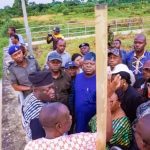The Nigerian government has approved the award of a $470 million contract for the greater Abuja Water Supply Project to provide water for residents of the Nigerian federal capital.
The Federal Executive Council approved the contract at its meeting presided over by the Acting President, Professor Yemi Osinbajo.
Minister of the Federal Capital Territory, Mohammed Bello, who briefed State House Correspondents on the outcome of the meeting, said the Greater Abuja Water Supply Project, which was one of the three memoranda his ministry presented at the meeting, was aimed at providing potable water supply to greater part of the Abuja.
“This project, which is being funded by the China EXIM Bank, is to provide water to what we call loops 1, 2, 5 and 6,” Bello said, explaining that the overall master plan for Abuja has 10 loops out which loops which “loops 3 and 4 are already operational, providing water to Garki, Asokoro and the Central Business District.”
He said the project would leverage on the Lower Usuma Water Treatment Dam and the Wupa Water Treatment Plant in Abuja, which is reputed to be one of the largest in Africa.
Alum Contract
Bello also said that the council also approved the award of a N186 contract for the supply of 1, 000 tonnes of alum to the FCT Water Board.
He said the alum supply contract was awarded to an indigenous manufacturing company “in line with the federal government local-content policy as well as encouraging investors that are employing labour to be able to continue in their businesses.”
Bello also stated that a 24-month extension contract was awarded for the Wupa Water Treatment Plant, Abuja for maintenance, training and retraining of staff.
He said this would involve the employment of Nigerian professionals, artisans and non-skilled labour.
Economic Recession
The Minister of Budget and National Planning, Senator Udoma Udo Udoma, who was also at the briefing, said the economic recession in Nigeria might end by the end of this year, stating that government was making efforts in agriculture, solid minerals and infrastructure to stimulate the economy and make it more competitive.
Udoma said he briefed the council on the recently released National Bureau of Statistics, NBS, fourth quarter gross domestic product report, which also contained the full report for 2016.
He said the NBS report showed that the economy contracted by 1.3% which was a lower level of contraction than the previous quarter, indicating that Nigeria was beginning to recover from recession.
According to him, the overall report was better than what was projected by many, including the International Monetary Fund, IMF, which had projected that it was going to be minus 1.8% but it turned out to be minus 1.5% in 2016.
On the Economic Recovery and Growth Plan, ERGP, of the President Muhammadu Buhari administration, Udoma said government was working towards restoring growth, investing in the people and building a competitive economy.
He said the plan has five execution plans, including stabilizing the macro-economic environment, achieving agriculture and food security, ensuring energy sufficiency, improving transportation infrastructure and driving industrialization with a focus on small and medium enterprises.
He said that government was determined to move the economy “from the negative growth that we experienced in 2016 to a growth rate of 7% by 2020.”
VON










